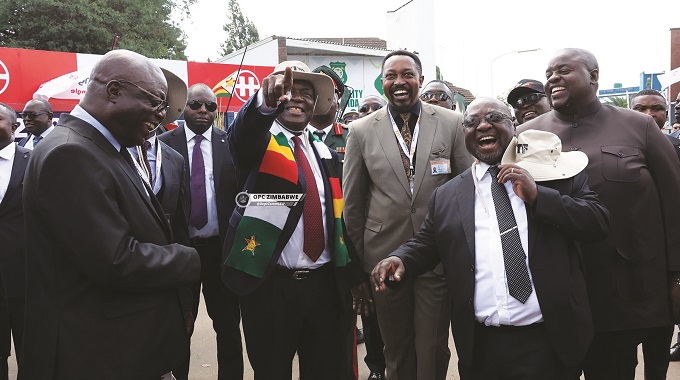WATCH: Russia ready to support Africa agriculture revolution

Nduduzo Tshuma in St Petersburg, Russia
RUSSIAN President Vladmir Putin has said Africa, with the application of appropriate agricultural technologies and the correct organisation of production, can in the long term achieve food security and become an exporter of various types of food.
Speaking during a plenary session of the Russia–Africa Economic and Humanitarian Forum at the Second Russia-Africa Summit here on Thursday, President Putin said his country stands ready to offer the continent technical assistance to leapfrog it to a net producer of food.
“In principle, we are convinced that with the application of appropriate agricultural technologies and the correct organisation of agricultural production, Africa can in the long term not only feed itself and ensure its own food security, but also become an exporter of various types of food.
“And Russia will only support you, I assure you,” said President Putin.

A delegation of African Journalists taken on a tour of the PhosAgro plant in Volkhov, Russia
The Russian President revealed that he had discussed the issue during bilateral meetings with African heads of State the previous day.
“…and my African colleagues told me, ‘we can produce food, we need technology and the appropriate support.’ For its part, Russia is ready to share its expertise in agricultural production with African countries and to provide assistance in introducing the most advanced technologies,” said President Putin.
As part of Russia’s initiative to assist Africa, the country’s largest exporter of mineral based fertilisers to Africa, PhosAgro on the same day launched a free online educational platform, the “ProAgro Lectorium” to provide African farmers with expert knowledge in the field of modern agriculture in order to ensure food security in the continent.
The platform includes digitised lectures on various topics, such as the sustainable agriculture, basics of plant mineral nutrition, correct use of mineral fertilisers to achieve food security, producing crop products that meet the highest consumer demands.
The lectures, according to PhosAgro, will be conducted by experts of the Russian Fertilizers Producers Association, well–known scientists from the Russian Academy of Sciences, Russian State Agrarian University – Moscow Timiryazev Agricultural Academy (RSAU – MTAA) and other agricultural universities, as well as top managers of the world’s leading agricultural enterprises.
African universities have already taken a keen interest in the programme with the prestigious Makerere University of Uganda and the University of Zambia among institutions that signed memoranda of understanding with PhosAgro at the summit.
In an interview at the organisation’s stand, PhosAgro’s deputy chief executive officer for sales marketing and logistics Mr Mikhail Sterkin said the educational programme was invented in Russia four years ago before it was spread to Africa.
In Russia, Mr Sterkin said, PhosAgro is working with 35 agricultural universities and the online platform has 400 lectures on 11 topics with more than 100 speakers while the auditorium has 22 000 speakers.
He said the programme keeps farmers up to date with new products in sustainable agriculture development.
“We are trying to keep (African) farmers updated on the newest instruments that can help them achieve best yields so that they make money and be the best in their field,” he said.

Mr Mikhail Sterkin
Mr Sterkin said the platform for African farmers so far has 33 lectures on 11 topics and the organisation wants to partner local n universities and scientists for the programme to end hunger in the continent.
Addressing a delegation of African journalists at PhosAgro’s new plant in Volkhov, Leningrad Region on Wednesday, ceo and member of the Board of Directors, Mr Mikhail Rybnikov said the platform adds to a number of initiatives by the organisation in the continent including the Regional African Soil Laboratory Network (AFRILAB) launched in 2019 in partnership with the Food and Agriculture Organisation (FAO).
“Currently, the African network comprises 143 laboratories from 48 countries that evaluate the quality and safety of fertilisers and monitor soil conditions,” said Mr Rybinkov.
He said in October 2020, together with FAO, PhosAgro launched the global Doctors for Soil programme, which includes the production of agricultural toolkits – soil first aid kits.
The programme, Mr Rybinkov said, allows allow farmers in developing countries, especially African countries, to evaluate the conditions of their fields and determine the nutrients to be applied to have the maximum harvest.
“PhosAgro, together with the UNESCO, annually awards grants for environmental research as part of the Green Chemistry for Life programme.
Over the 6 rounds of the programme, an international jury reviewed over 800 applications and selected over 40 young researchers as grantees, 12 of whom are talented African scientists,” said Mr Rybinkov.
“In addition, over 100 young researchers from Africa received monetary scholarships as part of the Green Chemistry Summer Schools organised by the International Union of Pure and Applied Chemistry (IUPAC) and PhosAgro.”
Meanwhile, with a market share of 33%, PhosAgro expects to double its shipments to Africa in the next three years.
“Over the past 5 years, the company has increased the supply of mineral fertilisers to Africa 4.5 times from 117.9 thousand tonnes in 2018 to 540 000 tonnes in 2022. Over the past year alone, PhosAgro’s export to African countries grew by a quarter,” said Mr Rybinkov.
“The company expects to double its shipments in the next 3 years. The launch of a new plant in Volkhov (Leningrad Region) is a factor in expanding the export potential to Africa. The new million-plus PhosAgro plant is located next to the Baltic ports focused on exporting products to friendly countries. PhosAgro supplies its products to 21 African countries and is actively working to expand its export geography.”

Mr Mikhail Rybnikov
Mr Rybinkov said PhosAgro’s wide range of products allows the company to take into account the specificities of African regions and offer customers the most sustainable solutions and make a significant contribution to the continent’s food security.
“Zinc deficiency is widespread in African soils, resulting in a deficiency of this important micronutrient in the diet. The human body is more susceptible to a number of infectious diseases when zinc deficiency occurs.
“This problem is solved by PhosAgro’s zinc-containing fertilizers, which not only saturate plants with zinc, but also help them resist stresses associated with diseases and pests,” he said.
“PhosAgro’s range also includes boron-containing fertilizers, which help address the problem of boron deficiency during frequent droughts on soils with low organic matter content, which is particularly common on the African continent.”
Added Mr Rybinkov, “According to UN statistics, 40% of land in Africa suffers from degradation due to cadmium from fertilizers with heavy metal impurities. Russian mineral fertilizers do not contain concentrations of cadmium and other toxic substances harmful to human health and soil, and have the best eco-efficiency indicators in the world.
“Safe fertilizers are key to the health of soils and the safety of agricultural products.”









Comments